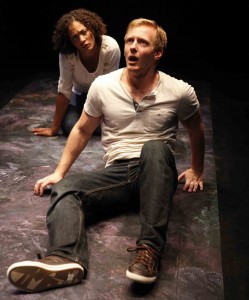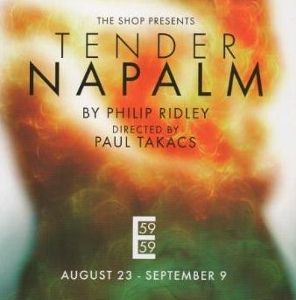EXPLOSIVE AND EXQUISITE
“I’d rather be unhappy in her world than happy in another,” says the Man about the Woman, in Philip Ridley’s outstanding new play Tender Napalm, about a couple’s love in an abyss of tragedy.
While hardly a simple statement, this dynamite production at 59E59 is as minimalist as it gets. The theater is the size of a living room, rectangular, with two rows of seats on either side of a performance space which is less than six feet wide and about three times as long. The two actors, the Man (Blake Ellis) and the Woman (Amelia Workman), are dressed in contemporary street clothes (the costumes by Audrey Nauman are subtly evocative and very serviceable), they use no props, and the lighting is unchanging for most of the show. But the world that’s created is amazing.
 Tender Napalm doesn’t have a plot in the conventional sense. Its goal rather seems to be to let us in on the couple’s state of being as they struggle with their relationship in the aftermath of a catastrophe. It does this through poetic allegories – fantastic fairytale adventures that the Man and Woman invent out loud, featuring things like sea monsters, unicorns and aliens. It’s a tricky conceit to create two absorbing characters who, for most of the play, are essentially living in a dream world. But the playwright, director and actors pull it off brilliantly.
Tender Napalm doesn’t have a plot in the conventional sense. Its goal rather seems to be to let us in on the couple’s state of being as they struggle with their relationship in the aftermath of a catastrophe. It does this through poetic allegories – fantastic fairytale adventures that the Man and Woman invent out loud, featuring things like sea monsters, unicorns and aliens. It’s a tricky conceit to create two absorbing characters who, for most of the play, are essentially living in a dream world. But the playwright, director and actors pull it off brilliantly.
 Not only is Mr. Ridley’s writing riveting and structurally unassailable, it is also uniquely beautiful, with images rendered in juicy detail:
Not only is Mr. Ridley’s writing riveting and structurally unassailable, it is also uniquely beautiful, with images rendered in juicy detail:
“I could get a spoon and prise it in your eye sockets. This part here. Above the cheekbone. Your eyes would water. Your tears would fill my spoon. So that when your eyes eventually pop out they would land in the spoon with a gentle…splosh. Like the sound of a goldfish turning suddenly in its bowl.”
Paul Takacs’ direction is passionate and flawless. There’s not a single detail, not a word or a gesture or a beat or an emotion that is overlooked or allowed to slide. Without props, Mr. Takacs’ performers create spaces and places with their bodies, their voices, their accents. Everything feels sharp, energized, and specific, while working towards a single destination; we might not know what that destination is, but everything on the way feels right.
 Ms. Workman and Mr. Ellis both deliver extraordinary performances, capturing the nuances of their characters with brilliant precision, infusing their words with such truthful emotion that even when they are speaking of imaginary things we are completely invested in the personages’ inner truth, which is what makes those make-believe stories so compelling. The actors move as effortlessly from one emotional extreme to another as they do through the performance space (movement credited to Yasmine Lee); their gestures and poses evoke both their exterior and interior realities while at the same time remaining completely naturalistic. And the intimacy they achieve is lovely, at times even disturbing, though quite appropriately so – one instance of a character describing the inserting of a grenade into another’s intimate orifice comes to mind.
Ms. Workman and Mr. Ellis both deliver extraordinary performances, capturing the nuances of their characters with brilliant precision, infusing their words with such truthful emotion that even when they are speaking of imaginary things we are completely invested in the personages’ inner truth, which is what makes those make-believe stories so compelling. The actors move as effortlessly from one emotional extreme to another as they do through the performance space (movement credited to Yasmine Lee); their gestures and poses evoke both their exterior and interior realities while at the same time remaining completely naturalistic. And the intimacy they achieve is lovely, at times even disturbing, though quite appropriately so – one instance of a character describing the inserting of a grenade into another’s intimate orifice comes to mind.
 The better a creative work the more reluctantly I find myself writing about it (and not because I prefer dealing out condemnation to praise). Deconstructing something wonderful to try and explain why and how it succeeds, as well as what precisely is so wonderful about it, I find somewhat distasteful, pointless and doomed to failure; a work of art is greater than the sum of its parts and demands to be experienced as a whole, not “understood.” (Understanding such a work, despite what some criticism professors will tell you, is really only useful to other artists.) These are my feelings about Tender Napalm, a terrific show that needs to be experienced, not read about.
The better a creative work the more reluctantly I find myself writing about it (and not because I prefer dealing out condemnation to praise). Deconstructing something wonderful to try and explain why and how it succeeds, as well as what precisely is so wonderful about it, I find somewhat distasteful, pointless and doomed to failure; a work of art is greater than the sum of its parts and demands to be experienced as a whole, not “understood.” (Understanding such a work, despite what some criticism professors will tell you, is really only useful to other artists.) These are my feelings about Tender Napalm, a terrific show that needs to be experienced, not read about.
photos by Carol Rosegg
Tender Napalm
Presented by The Shop at 59E59 Theaters in New York City
scheduled to end on September 9, 2012
for tickets, visit http://www.59e59.org/

